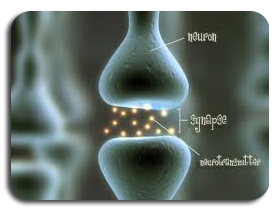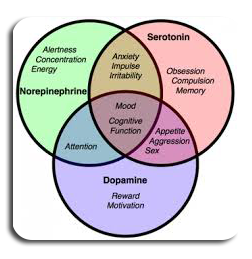Neurotransmitters are the brain's chemical messengers, assisting the brain in controlling the many tissues and functions of the body through glands, organs, and muscles.
Functioning primarily in the Central Nervous System (CNS), neurotransmitters are powerful chemicals that regulate numerous physical and emotional processes such as mental performance, emotional state, physical energy, and pain response.
Numerous clinical studies have shown that inadequate neurotransmitter function has a profound influence on overall health and well-being. In fact, imbalances in certain neurotransmitters are associated with many of the prevalent symptoms and conditions seen in doctors' offices today:

- Adrenal Dysfunction; fatigue, insomnia
- Loss of Mental Focus; ADD, ADHD, cognitive fog
- Addiction and Dependency
- Hormonal Imbalances; E2 dominance, E2 deficiency, low androgens
- Loss of Appetite Control; insulin resistance
- Mood Disorders Depression, anxiety
Compounding these symptoms of imbalance are the myriad of bioactive substances like caffeine, alcohol and nicotine and many of the medications used to manage these conditions as well as some cholesterol-lowering medications. These substances and medications can contribute to neurotransmitter depletion and resulting symptoms by suppressing or artificially stimulating NT receptor function. When functioning properly, the neurotransmission system has natural checks and balances in the form of excitatory and inhibitory neurotransmitters. These are classified according to their effects on postsynaptic membranes (Receptor sites).
Excitatory neurotransmitters cause depolarization of the membrane and promote an action potential. Inhibitory neurotransmitters cause hyperpolarization and depress or inhibit an action potential.
This Neurotransmitters Fact Sheet provides an overview of six important neurotransmitters and their respective roles in various symptomatic conditions:
SEROTONIN is an inhibitory neurotransmitter considered to be the master neurotransmitter. Adequate amounts of serotonin are necessary to balance any excessive excitatory (stimulating) neurotransmitter firing in the hypothalamus. Serotonin imbalance is one of the most common contributors to mood problems, which is considered by some as a virtual epidemic in the United States. It also regulates many processes such as carbohydrate cravings, sleep cycle, pain tolerance, and appropriate digestion, and can be associated with decreased immune system function.

High stress, insufficient nutrients, fluctuating hormones, and the use of stimulant medications or caffeine all contribute to the depletion of serotonin over time. When serotonin is out of range then depression, anxiety, worry, obsessive thoughts and behaviors, carbohydrate cravings, PMS, difficulty with pain control, and sleep cycle disturbances can result. Serotonin is key to feelings of happiness and very important for emotions because it helps protect against both anxiety and depression.
DOPAMINE is our main 'focus' neurotransmitter, largely responsible for regulating the pleasure/reward pathway, memory, and motor control. Its function creates both inhibitory and excitatory action depending on the dopaminergic receptor it binds to.
When dopamine is either elevated or low, memory issues frequently occur: forgetting where items are, forgetting what a paragraph said immediately after reading, or simply daydreaming and not being able to stay on task.
Stimulants such as medications for ADD/ADHD and caffeine will cause dopamine to be pushed into the synapse so that focus is improved. Unfortunately, stimulating dopamine continually can inhibit natural transmission, reducing demand over time. Common symptoms with low dopamine levels include:
- loss of motor control
- addictive behavior
- cravings, compulsions, and loss of satisfaction.
These feelings lead to drug use, drinking alcohol, smoking cigarettes, gambling, and overeating. These actions are a result of an unconscious attempt to self-medicate, looking for satisfaction that is not occurring naturally in the body.
When dopamine levels are elevated, symptoms may manifest in the form of anxiety or hyperactivity. High dopamine has been observed in patients with poor GI function, autism, mood swings, psychosis and children with attention disorders. L-DOPA is a precursor to dopamine, and may also cause elevations in dopamine. Some therapies utilize L-DOPA for Parkinsonian symptoms.
NOREPINEPHRINE (Nor-Adrenaline) is an excitatory neurotransmitter responsible for stimulatory processes for attention and focus. It is produced by the adrenal medulla or synthesized from dopamine. Norepinephrine plays a critical role in survival.
First, it relays messages in the sympathetic nervous system as part of the autonomic nervous system's fight-or-flight response.
Second, norepinephrine prepares the brain to encounter and respond to stimuli from the environment thereby facilitating vigilance. In both roles, norepinephrine mediates arousal.
High levels of norepinephrine are linked to anxiety, stress, high blood pressure, and hyperactivity.
Low levels are linked to a lack of energy, focus, and motivation.
Norepinephrine: Epinephrine Ratio: The Norepi: Epi ratio is an indicator of adrenaline conversion (epinephrine is synthesized from norepinephrine). Low cortisol can inhibit this conversion process, leading to an elevated ratio. Anxiety, burnout, and poor blood sugar control are associated with an elevated Norepi: Epi ratio.
EPINEPHRINE (Adrenaline) is synthesized from norepinephrine and is an excitatory neurotransmitter that helps regulate metabolism, heart rate, and blood pressure. Epinephrine is involved in managing the body's metabolic "fight or flight" response, rapidly preparing the body for action, boosting the supply of oxygen and glucose to the brain and muscles, while suppressing other non-emergency bodily processes (digestion in particular).
This stress preparation increases heart rate and stroke volume dilates the pupils and constricts arterioles in the skin and gastrointestinal tract while dilating arterioles in skeletal muscles. It also increases the catabolism of glycogen to glucose in the liver, thereby elevating the blood sugar level.
Elevated levels of epinephrine are associated with hyperactivity, ADHD, anxiety, sleep issues, and low adrenal function. Low levels are associated with decreased energy, fatigue, depression, insufficient cortisol production, chronic stress, burnout, poor recovery from illness, dizziness, and persistent adrenal stimulation.
Long-term over-stimulation of the adrenal glands can cause epinephrine stores to be depleted, resulting in chronic low energy and weight gain.
GABA is an inhibitory neurotransmitter that is often referred to as "nature's valium-like substance". GABA is a significant mood modulator, essential for regulating norepinephrine, epinephrine, dopamine, and serotonin.
High levels of GABA may indicate excitatory overload, due to the increased demand for GABA to balance the surplus excitatory neurotransmitter activity.
These high levels may result in a 'calming' action that contributes to sluggish energy, feelings of sedation, and foggy thinking. Low GABA levels are associated with adrenal distress and Hypothalamus-Pituitary-Adrenal Axis (HPA Axis) feedback dysfunction.
Without the inhibiting function of GABA, impulsive behaviors are not controlled, contributing to a range of anxious and/or reactive symptoms that extend from poor impulse control to seizure disorders.
GLUTAMATE is an excitatory neurotransmitter considered to be the major mediator of excitatory signals in the central nervous system and is involved in most aspects of normal brain function including cognition, memory, and learning. In fact, it is believed that 70% of the fast excitatory CNS synapses utilize glutamate as a transmitter.
Consistently high levels of glutamate can be an indicator of excitotoxicity. Elevated glutamate levels are more commonly associated with panic attacks, anxiety, excess adrenal function, impulsivity, OCD, and depression. Low glutamate levels have been associated with agitation, memory loss, sleeplessness, low energy level, insufficient adrenal function, and depression.
Putting It All Together
Identifying and managing neurotransmitter imbalances is facilitated with a noninvasive urinary test. Testing provides a tool to understand each patient's specific neuroendocrine imbalances, which can be corrected with nutraceutical, BHRT, diet, and lifestyle interventions.
This Neurotransmitter Fact Sheet identifies numerous symptoms and conditions associated with neurotransmitter imbalances. It is especially important to understand that there are agonistic/antagonistic interrelationships of the neurotransmitters with adrenal hormones and sex hormones.
Changes in sex hormones and adrenal hormones can lead to neurotransmitter imbalances. And at the same time, neurotransmitter imbalances will affect hormone production and function.
Testing both neurotransmitters and hormones provides a comprehensive view of the body's functional neuroendocrine status, and brings to light additional factors that may be contributing to symptoms.
See our Neurotransmitter Testing to check your levels
Health Disclaimer: All information given about health conditions, treatments, products, and dosages is not intended to be a substitute for professional medical advice, diagnosis, or treatment. This is provided only as a suggested guideline.

